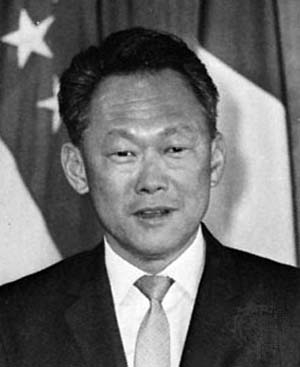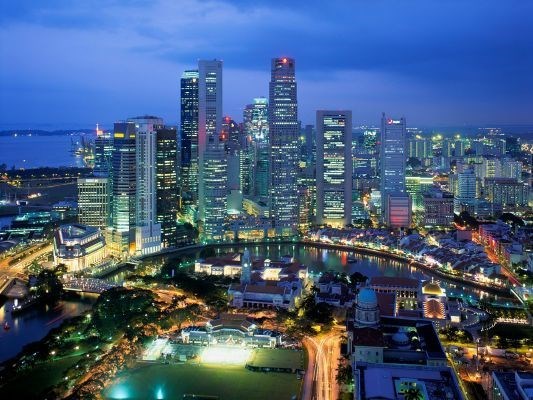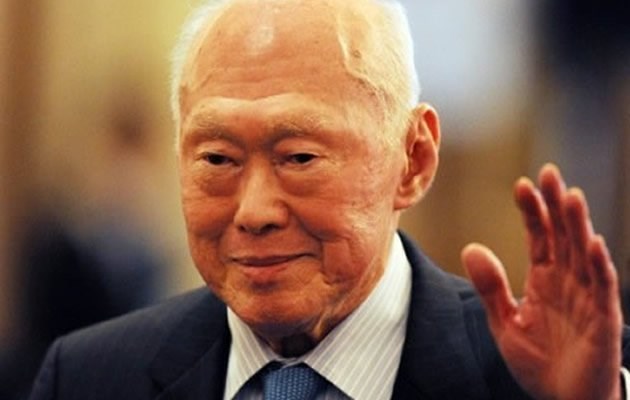 |
| A Young Lee Kuan Yew Recently Elected (http://komunitikini.com/news/comment-episodes-the- ()) |
Lee Kuan Yew: Father of a Nation Lee Kuan Yew took a malarial strip of land and turned it into a first world economic powerhouse practically free from corruption in less than thirty years. He was born in Singapore on September 16, 1923; a time when Singapore was still but a British colony. After moving to England and graduating with honors from Cambridge Law, he moved back to Singapore to help fight for its independence. Yew was elected Prime Minister of Singapore in 1959. In 1961, Singapore gained full independ ence as part of the Malaysian Federation, from which it was expelled in 1963 as a result of racial tensions. After Singapore's expulsion from the Malaysian Federation, Yew fought hard for the survival of this small, undeveloped piece of land. Amazingly, Lee Kuan Yew turned that third world country into one of the most successful countries in the world. Yew resigned as Prime Minister of Singapore in 1990 as a result of old age. He exerted some influence in the government up until 2011, when he stepped down to male room for a newer generation of leaders, ending a rich and unique legacy. Heroes have certain qualities that are, in addition to their accomplishments, what they are recognized for. Lee Kuan Yew has many of those heroic qualities, among them determination, pragmatism, and integrity. It is how Yew used those traits to help millions of people that is his most defining characteristic. Admittedly, there are many outside of Singapore who do not feel that Lee Kuan Yew is heroic. In the process of achieving great things for Singapore, Lee Kuan Yew and his political party eliminated many liberties seen in true democracies around the world. International and influential organizations such as Human Rights Watch and Freedom House have stated concerns about Singapore's lack of right's (Elegant). These accusations and the statements they make about the reality of human rights and democracy in Singapore are true. However, all the good that Lee Kuan Yew has accomplished must also be acknowledged. When considering the millions of Singaporeans who have been lifted out of extreme poverty and sickness into wealth and prosperity; who have been raised from the third world to the first in under 30 years, there can be no doubt as to the benefit and necessity of Yew's regime. Democracy being an inherently messier and inefficient system, it would have been impossible for Singapore to have advanced as much as it did under Yew's soft authoritarianism (Lim). Many people believe Yew to be cruel in denying true democracy and many human rights. However, it would have been far more cruel to institute a democracy and to allow those certain rights; as a result of which countless Singaporeans would be living in slums today. In bettering his country, Lee Kuan Yew acted with integrity, pragmatism, and devotion towards a higher standard to help millions of people, and he is therefore a true hero.
Although Lee Kuan Yew had dictatorially ruled over Singapore for thirty years, he used that position of power to help his people. Examples of some of the accusations against Lee Kuan Yew are as follows: "...[Lee Kuan Yew has been] accused by human rights groups of limiting political freedoms and intimidating opponents through libel suits." (Yew, Lee Kuan. "Days of Reflection for Man Who Defined Singapore."). Also, "Lee was so worried the young nation could implode because of racial or ideological strife that he ran Singapore in a relatively authoritarian way... Unfavorable newspapers and magazines have been censored, and critics, journalists, and social critics as a group have been made personae non gratae, especially if they accused him of nepotism." (Chong). While these accusation are true, they overlook the fact that these actions were necessary in getting Singapore to where it is today. In order for Lee Kuan Yew to have accomplished all that he did, Yew needed to be in an extreme position of power where he was unquestionably the leader. If Yew did not have total control, and was mired in much local politicking, then he would not have been able to make half the decisions that he actually made in real life. Undoubtedly, if Lee Kuan Yew's accomplishments were few, or detrimental to his people, a lack of his total control would have been better for Singapore. Yet, the fact of the matter is that Lee Kuan Yew's accomplishments have done enormous good for his people. "He courted multinational investors to upgrade the economy from mass manufacturing to high-tech industry. He built the region's finest infrastructure of airport, port, roads and communications networks. He established a public housing system and the Central Provident Fund savings pool that gave every citizen a stake in the system. He virtually abolished crime...and developed Asia's best health and education systems." (McCarthy). In addition, "Lee's life has been one of success in international and domestic politics and economics. His brand of nationalism, of building a Singaporean identity from such diverse racial and ethnic groups, has come about without any threat of political opposition. His achievements in making Singapore stable, well educated, and prosperous are formidable and the envy of all developing countries." (Chong). Thus, as Lee Kuan Yew and his government have done enormous good for the people of Singapore, it can be said that Yew's administration has had an overall positive effect. In fact, when Yew left office, his approval rating was very high among Singaporeans themselves. "Lee left Singapore... [with] his reputation gilt-edged." (McCarthy). The majority of Singaporeans, then, felt that their leader was a positive force. This speaks volumes to Yew's standing and legitimacy, as the people whom he governed for over thirty years feel that he has been an overall good leader. Lee Kuan Yew himself admits "'I'm not saying that everything I did was right," he said, "but everything I did was for an honorable purpose.'" (Yew, Lee Kuan. "Days of Reflection for Man Who Defined Singapore.").
 |
| Modern Day Singapore (http://www.eltoma-cyprus.com/pages/singapore-offsh ()) |
An essential characteristic that defines a hero is integrity, a quality that shines through Lee Kuan Yew's actions. His integrity can be seen through his actions, which resulted in the betterment of millions. "His[Lee Kuan Yew] life has shaped and been shaped by the small territory at the tip of the Malaysian peninsula that he made first into a country, and then a rich country. He had few interests outside his work." (McCarthy). It is clear that Lee Kuan Yew dedicated his life towards helping Singapore. The results that he achieved are testament to his dedication. However, none of what he accomplished would have been possible had he, like so many other leaders, been looking after his own interests. A Lee Kuan Yew that did not have the interest of Singapore ultimately at heart, or did not tie in his own interests to Singapore's, would not have had integrity; the trait that defines so much of so many people by it's presence or lack thereof. It follows then that Yew does possess a great amount of integrity, in light of his achievements; as he is always true to his word and fulfills the promises he makes to his people. Lee Kuan Yew is not only free of corruption himself, but does his best to eradicate it from all of Singapore: "Singapore is the least corrupt country in Asia according to the annual surveys recently conducted by the Political and Economic Risk Consultancy and Transparency International."(Quah). In addition, " Mr. Lee [Current PM Lee Hsien Loong] thanked former prime ministers Lee Kuan Yew and Goh Chok Tong for their leadership in building a clean and incorrupt Singapore." (Ismail). Lee Kuan Yew clearly had a central role in creating Singapore, and among other things his zero corruption tolerance has made Singapore among the least corrupt and most efficient countries in the world. The fact that he is dedicated to eradicating corruption speaks volumes to his own integrity. If Yew wanted to take advantage of Singapore, purely for his own wealth or other purposes, then a weak, inefficient and corrupt government would have been the best thing for him. Such a chaotic environment would have been much easier to exploit than a focused one which eliminates corruption. Thus, Yew is clearly putting his interests alongside Singapore's. The good that Lee Kuan Yew has done for Singapore can never have come from a will to take advantage of or exploit Singapore, and can only come from the dedication and selflessness that Lee Kuan Yew has displayed. As such, Lee Kuan Yew's integrity to his goals, the goals of advancing Singapore, is undeniable.
Guided by his pragmatism and devotion to a higher standard, Lee Kuan Yew drove himself towards the series of achievements that created modern-day Singapore. Lee Kuan Yew always strove towards a better Singapore, using the good of Singapore as his guide: "'I'm not guided by what Human Rights Watch says. I am not interested in ratings by Freedom House or whatever. At the end of the day, is Singapore society better or worse off? That's the test." [said Lee Kuan Yew.] That test, even Lee's fiercest detractors would concede, Lee has passed spectacularly.'" (Elegant). Yew ignored the international community, and chose to place the overall good of Singapore as his sole guide. The fact that he placed Singapore above everything else shows both his pragmatism and his commitment to a higher standard. Through valuing the good of Singapore above the concerns of others Lee Kuan Yew shows his practical approach to improving his country. Additionally, by valuing the good of his country to such a large extent Yew's dedication to a higher standard is clear. The pragmatism that characterizes Lee Kuan Yew also ensures the working of the system towards the advancement of the people. "'It's incorrupt. It's efficient. It's meritocratic. It works. The system works regardless of your race, language or religion because otherwise we'd have divisions. We are pragmatists. We don't stick to any ideology. Does it work? Let's try it and if it does work, fine, let's continue it. If it doesn't work, toss it out, try another one. [said Lee Kuan Yew.]'" (Excerpts). Lee Kuan Yew explains that it is a practical approach and the ability to do whatever works best that frees Singapore to advance. While pragmatism is not necessarily in and of itself a distinctively heroic trait, the way that Yew utilizes that trait to efficiently better Singapore is heroic. Yew's actions and results should themselves be celebrated and used to define him as a hero. The simple objectiveness which he uses to improve Singapore shows that little else besides success matters. His dedication to achieving a higher standard for Singapore is therefore evident by the importance that Yew places on the success of Singapore. Lee Kuan Yew used an intensely practical approach while working towards his vision of a better Singapore, and it is for this vision and the prosperity it has brought Singapore that Lee Kuan Yew should be celebrated for.
 |
| Prime Minister Lee Kuan Yew After Retirement (http://sg.news.yahoo.com/blogs/singaporescene/lee- ()) |
Lee Kuan Yew, in raising a nation, displayed an incredible amount of integrity, determination, pragmatism, and a devotion to higher ideals not often matched in the world. Yew's success in advancing and creating an identity for a previously divided and destitute people is nothing short of a miracle. Raising Singapore took great dedication and genius; for his accomplishments Lee Kuan Yew has earned his place among the greats in the minds of many. There are also many people, however, who do not agree with my view of Lee Kuan Yew, and who bring up valid points questioning Yew's heroism. Nevertheless, I believe that Lee Kuan Yew has more than compensated for those questionable actions in light of his achievements. Learning about Lee Kuan Yew has opened my mind to the possibility that good solutions do not always garner the appreciation. His story has forced me to think about new policy's, thoughts, and a style of thinking that affords unique solutions to tough questions. Yew's story has also given me inspiration; a personal inspiration urging me to better myself and the world around me. Using his wit and determination; full of integrity and hope of a better future; applying his pragmatic philosophy and unshakeable devotion towards the overall good; Lee Kuan Yew built his legacy in the form of a prosperous people and a country flowing with opportunity. There are few who can match in either deed or heart this brilliant statesman, and it is for these reasons that people should and will forever remember Lee Kuan Yew as a hero.
Works Consulted
Anderson, Tim. "Lee Kuan Yew." Lee Kuan Yew (2007): 1. Biography Reference Center. Web.
12 Dec. 2012.
Chong, Peng-Khuan, and Chong Peng-Khuan. "Lee Kuan Yew." Great Lives From History: The
Twentieth Century (2008): 1. Biography Reference Center. Web. 11 Dec. 2012.
Elegant, Simon. "Lee Kuan Yew."TIME Magazine. N.p., 13 Nov. 2006. Web. 11 Dec. 2012.
Elgin, Molly.Asian Values: A New Model for Development? Stanford Journal of East Asian Affairs. Stanford University, Summer 2010. Web. 8 Jan. 2013.
"Excerpts from an Interview with Lee Kuan Yew." Interview by Leonard M. Apcar, Wayne
Arnold, and Seth Mydans. The New York Times 29 Aug. 2007: n. pag. The New York Times. Web. 11 Dec. 2012.
Hua, Lee Siew. "Insight: High 5 for LKY Singapore's Chief Gardener." The Straits Times [Singapore] 28 May 2011: n. pag. Singapore Press Holdings. Web. 8 Jan. 2013.
Ismail, Sailfulbahri. "PM Lee Says Government Won't Tolerate Corruption." Channel News Asia.
MediaCORP, 18 Sept. 2012. Web. 18 Dec. 2012.
Lim, Catherine. "Exit Lee Kuan Yew." The Asia Mag: Through Asian Eyes. N.p., 24 May 2011. Web. 9 Jan. 2013.
McCarthy, Terry. "Lee Kuan Yew." TIME Magazine. N.p., 23 Aug. 1999. Web. 11 Dec. 2012.
The Guardian. "Why It's No Change In Singapore." Editorial. The Guardian. Guardian Media
Group, 15 Aug. 2004. Web. 11 Dec. 2012.
Mydans, Seth, and Wayne Arnold. "Lee Kuan Yew, Founder of Singapore, Changing with
times." The New York Times. The New York Times, 29 Aug. 2007. Web. 11 Dec. 2012.
Quah, Jon S.T. "Combating Corruption in Singapore: What Can Be Learned?" Proc. of Combating
Corruption in Singapore, Harvard University, Boston. Harvard University, n.d. Web. 18 Dec. 2012.
Yew, Lee Kuan. "Days of Reflection for Man Who Defined Singapore." Interview by Seth Mydans. The New York Times 10 Sept. 2010: n. pag. The New York Times. Web. 9 Jan. 2013.
Yew, Lee Kuan. "Minister Mentor Lee Kuan Yew's Dialogue at Singapore Energy Conference." SG Press Center. Proc. of Singapore Energy Conference, Raffles City Convention Centre, Singapore. Singapore Government, 4 Nov. 2008. Web. 8 Jan. 2013.
Yew, Lee Kuan. "Speech By Mr Lee Kuan Yew, Minister Mentor, At Speak
Mandarin Campaign's 30th Anniversary Launch, 17 March 2009, 5:00 pm at the NTUC Auditorium." Speech. Speak Mandarin Campaign's 30th Anniversary Launch. NTUC Auditorium, Singapore. 17 Mar. 2009. Channel NewsAsia. Web. 11 Dec. 2012.
Page created on 1/11/2013 12:00:00 AM
Last edited 1/11/2013 12:00:00 AM
